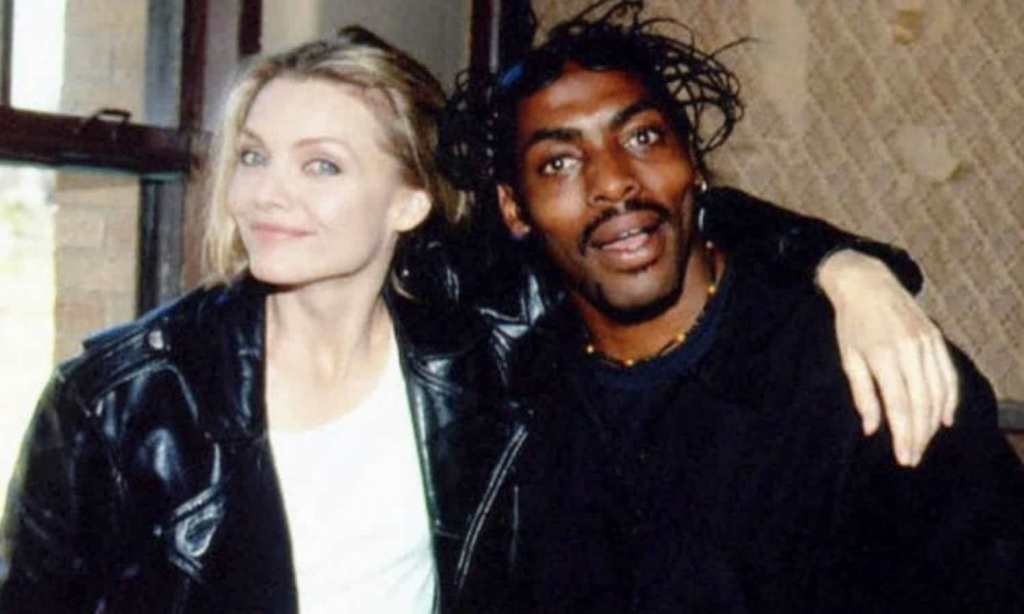In the latest instalment of: “Oh, man, that makes me feel old”, I was this week treated to the news that Gangsta’s Paradise, the rap classic from the Dangerous Minds soundtrack, turned twenty-freaking-five.
I was none-of-your-business years old when I first either saw the gritty film or heard the hit single (I don’t remember in which order these things occurred), and yet a quarter of a century later, the imagery immediately conjured by the songs opening chords remains unchanged.
I see a leather jacket-clad Michelle Pfeiffer straddling a chair backwards as Coolio — showing very little regard for both non-smoking rules and Michelle’s health, I might add — spits out his rhyme as he puffs on a cigarette. Classic Cools.
The song also evokes a palpable sense of nostalgia as I remember a year of many firsts. My first kiss (at exactly the stroke of midnight as 1994 became 95), the first time I was allowed to go to the movies with my friends without parental supervision, the first time I fell in love and the first time I experienced true heartbreak.
These memories, in turn, inspire an innate feeling of possibility and curiosity as I recall a time before the pressure of adulting, when the most urgent concern I had was when the next East 17 album was coming out. Yes, I said East 17 and no, I won’t be taking any follow up questions.
Anyway, if you’re thinking: “how on earth did she get all of that from lyrics such as: ‘I’m an educated fool with money on my mind got my 10 in my hand and a gleam in my eye’”, I swear there is a legitimate reason.
You see, music arouses a type of memory known as “implicit” – one that is reactive and unintentional. It allows us to access memories we might otherwise struggle to recall because our brains are constantly inundated with information. Music lends a hand through its rhyme and rhythm, which provides a structure we can remember and, when combined with lyrics and melody, create a series of elements that enables our mind to forever connect a song with an event or time period.
It’s worth noting that memories brought on by music do tend to come from very specific junctures in our lives. Songs that were popular when we were teenagers and young adults are far more likely to trigger an emotional reaction than ones we listened to in later years.
This could be, I suspect, partly due to our own natural evolution as people. When we are younger, so much of our life seems to revolve around music.
Reciting the lyrics of Top 40 hits at house parties; arms thrown over each other’s shoulders in angsty camaraderie. Subscribing to the importance of picking “our song” when in the throes of our first relationships and listening to sad songs on repeat when those same relationships end. And who could forget that intoxicating feeling of freedom that came from driving around with friends, P plates proudly on display, as we blasted our favourite tunes like we were the stars of our own road trip movie even though we had no place to go.
Music was there for it all like an invisible yet dependable confidant during a time when every song felt like it was written for or about us.
Psychologists call this the ‘reminiscence bump’ because it takes us back to a time when everything was new and meaningful. Think about it: when we’re young, music gives us a window into experiences we are yet to have, as adults we are able to assign value to the actual experiences themselves rather than sonic imaginings of them.
Interestingly, while music evokes emotion, the sound and feeling of it doesn’t necessarily define your feelings so it could be that a sad song reminds you of a happy time and a happy song a sad one.
Now, if you accessed your Spotify Wrapped this year and pop music was in your top 5 genres, here is a fun fact for you about how you might remember 2020 (no matter how hard you try to forget it.)
Pop is the type of music most likely to evoke memories from a certain time in our lives because it is a genre that tends to dominate the others. Usually upbeat and somewhat family-friendly, pop is often in the background of our lives — on TV commercials, played in retail shops and restaurants, and with a heavy rotation on the radio — so we are constantly consuming it, even if unintentionally.
So while I don’t exactly recall Gangsta’s Paradise being piped over the speakers as I browsed the aisles of my local Big W, the track did hold the number one spot on the ARIA charts for thirteen straight weeks and was 1995’s biggest-selling single in the country. Those stats invariably made Coolio’s pithy rap both a mainstay of my steady diet of popular music and the soundtrack to a year of firsts I hope I never forget.







